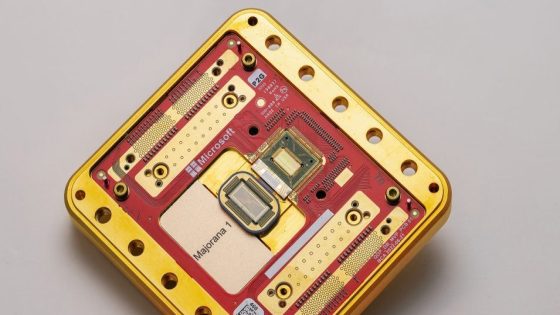Microsoft’s new Majorana 1 processor could transform quantum computing, marking a significant milestone in technology. Announced on February 22, 2025, this breakthrough involves the creation of topological qubits, which may revolutionize how we process information. What does this mean for the future of computing?
- Microsoft claims breakthrough in quantum computing
- First topological qubits created for storage
- Majorana 1 processor designed for a million qubits
- Potential to surpass IBM and Google
- Challenges remain in independent verification
- Quantum bits enable faster calculations
Microsoft’s Majorana 1 Processor: A Game-Changer for Quantum Computing
Could Microsoft’s Majorana 1 processor be the key to unlocking the full potential of quantum computing? With the ability to house up to a million qubits, this innovative technology may surpass existing systems. What challenges lie ahead for this ambitious project?
Understanding Topological Qubits and Their Potential
Topological qubits represent a significant advancement in quantum technology. Unlike traditional qubits, which can be fragile and easily disrupted, topological qubits are designed to be more stable. This stability could lead to breakthroughs in various applications, including:
- Enhanced cryptography and security measures.
- Faster drug discovery and material design.
- Improved simulations of natural systems.
- More efficient problem-solving capabilities.
What Are Topological Qubits and Why Do They Matter?
Topological qubits are built using Majorana particles, which exist in topological superconductors. These particles are theorized to offer greater resilience against errors, making them ideal for quantum computing. But what does this mean for everyday technology?
Challenges Ahead for Microsoft’s Quantum Leap
While the Majorana 1 processor shows promise, there are still hurdles to overcome. The peer-reviewed research has yet to provide independent verification of its capabilities. Will Microsoft be able to navigate these challenges and deliver on its ambitious claims?
The Future of Quantum Computing in the U.S.
The race for quantum supremacy is heating up, with Microsoft, IBM, and Google vying for the top spot. As advancements continue, the U.S. stands to benefit significantly from breakthroughs in quantum technology. How will this shape the future of computing and technology in America?










![Nothing Phone (3a) and Phone (3a) Pro leak in full in alleged images [Gallery]](https://news.faharas.net/wp-content/uploads/2025/02/Unveiled-Nothing-Phone-3a-and-Phone-3a-Pro-Leak-in-560x315.jpg)






















